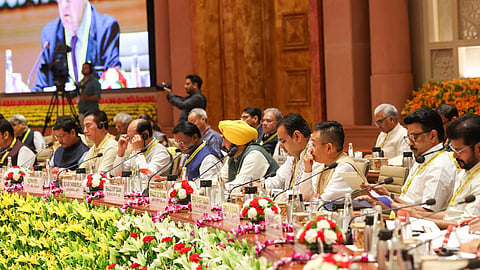

CHANDIGARH: Taking part in the meeting of the 10th Governing Council of the Niti Aayog on Saturday, Chief Minister Bhagwant Mann reiterated that Punjab has no surplus water for other states.
Mann said that in the wake of the grim water situation in the state, the Yamuna-Sutlej Link (YSL) canal should be considered for construction instead of the Sutlej-Yamuna Link (SYL) canal. He said the Ravi, Beas and Sutlej rivers are already in deficit and water should be diverted from surplus to deficit basins.
He said Punjab has repeatedly requested to be included in negotiations for the allocation of Yamuna waters as a pact for the Yamuna-Sutlej Link project was signed between the erstwhile Punjab and Uttar Pradesh on March 12, 1954 which entitled the erstwhile Punjab to two-thirds of the Yamuna waters.
Mann said this agreement did not specify any particular area to be irrigated by Yamuna waters, adding that before the re-organization, the Yamuna river, like the Ravi and Beas, flowed through the erstwhile state of Punjab. However, he bemoaned that while apportioning the river waters between Punjab and Haryana, the Yamuna waters were not considered, whereas the waters of Ravi and Beas were duly taken into account.
Citing a 1972 report by the Irrigation Commission, constituted by the Centre, Mann said it states that Punjab (post-1966, after its reorganization) falls within the Yamuna River Basin. Hence, if Haryana has a claim over the waters of the Ravi and Beas rivers, Punjab should also have an equal claim on the Yamuna waters, he insisted. Mann said these requests have been ignored, adding that due to non-construction of storage structures on the Yamuna river, the water is being wasted. He urged that Punjab's claim should be considered during the revision of this agreement, and the state should be given its due rights to Yamuna waters.
Alleging that the Bhakra Beas Management Board (BBMB) has a biased approach, he said it was constituted under the provisions of the Punjab Reorganization Act, 1966, with the mandate to regulate the supply of water and power from the Bhakra, Nangal and Beas projects to the partner states of Punjab, Haryana, Rajasthan, Himachal Pradesh, Delhi and Chandigarh.
He said that in the past, Punjab had been very liberal in sharing water with the partner states to meet their drinking water and other genuine requirements. Punjab was relying upon its groundwater reserves to meet its demand of water, particularly for the paddy crop.
Mann said that as a result, the groundwater level has depleted to a huge extent, so much so that 115 out of 153 blocks of the state (76.10 per cent) are overexploited, adding that this percentage is the highest amongst all the states in the country.
He said that now with the upgraded canal structure, Punjab itself is running short of its water requirement and even its share in the river waters is not sufficient to meet this. Despite the state's repeated requests, he said the BBMB did not take any action to advise the other partner states to regulate the release of water to Haryana as a result of which it exhausted its share by March 30. Mann said that considering the request of the Haryana government on humanitarian grounds, the state decided to release 4000 cusecs of water out of Punjab’s share to meet its drinking water requirement though Haryana has only a genuine demand of 1700 cusecs of water.
However, Mann said the BBMB ignored the interests of Punjab and decided to release 8500 cusecs of water to Haryana despite serious objections raised by Punjab. He said the BBMB has taken this decision against the consent of Punjab, adding that it should be advised to act as per the spirit and provisions of the law.
He alleged that officers of the state in the board are being marginalised and ignored, adding that the BBMB should adopt a transparent and neutral approach in its dealings with the two states.
Mann also raised the issue of CISF deployment at the Bhakra and Nangal dams. He said the security of the dams had been the sole responsibility of the concerned states since they were constructed. He said the Ministry of Power has taken the decision to depute the CISF for the security of the dams, which is unnecessary as there was no need to disturb a well-established operational set-up and it further degrades the rights of Punjab with respect to these dams. In view of this, Mann urged that the decision to depute the CISF be revoked.
Speaking on the desilting of the Harike head works, he said it is located at the confluence of the Sutlej and Beas rivers and is the main control point for supply of water to southwest Punjab and Rajasthan, besides controlling the flow into Pakistan. He said that over the years, the sedimentation of suspended silt or sand particles in the reservoir has drastically reduced its capacity and the backwater effect of the water required for optimal operation of canals is now being felt up to Kapurthala district, adding that large swaths of agricultural land along the Sutlej and Beas are becoming susceptible to flooding.
Mann said there is an urgent need for carrying out desilting of the reservoir at a cost of around Rs 600 crore, adding that as the reservoir area has been declared a Ramsar Convention site and is of national importance, the Centre and Rajasthan must share the cost of the project.